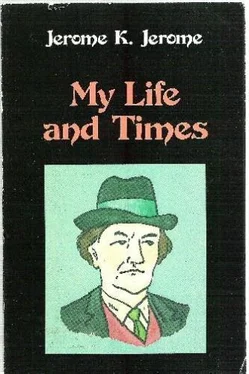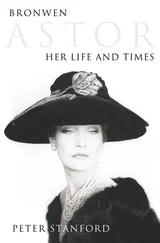I left school at fourteen, and through the help of an old friend of my father's, obtained a clerkship in the London & North-western Railway at Euston. My salary was twenty-six pounds a year, with an annual rise of ten pounds. But that first year, owing to a general revision of fares, over-time was to be had for the asking. Twopence halfpenny an hour it worked out, in my case, up till midnight, and fourpence an hour afterwards. So that often I went home on Saturday with six or seven shillings extra in my pocket. My Aunt Fan had died. I fancy the “property” at Notting Hill had disappeared; but my sister had won examinations and was in a good situation, so that our days were of peace, if not of plenty.
Lunches were my chief difficulty. There were, of course, coffee shops, where one quaffed one's cocoa at a penny the half pint; and “doorsteps”—thick slices of bread smeared plentifully with yellow grease supposed to be butter—were a halfpenny each. But if one went further, one ran into money. A haddock was fivepence, Irish stew or beef-steak pudding sixpence. One could hardly get away under ninepence, and then there was a penny for the waitress. There was a shop in the Hampstead Road where they sold meat pies for twopence and fruit pies for a penny, so that for threepence I often got a tasty if not too satisfying lunch. The pies were made in little shallow dishes. With one deft sweep of the knife, the woman would release it from its dish, and turning it upside down, hand it to you on a piece of paper; and you ate it as you walked along the street or round some quiet corner, being careful to dodge the gravy. It was best to have with one an old newspaper of one's own. Better still, from a filling point of view, would be half a pound of mixed sweet biscuits; while in the summer time a pound of cherries made a pleasant change. Some of the fellows brought their lunch with them and ate it in the office, but I was always fond of mooning about the streets, looking into the shop windows, and watching the people.
In my parents' time, among religious people, the theatre was regarded as the gate to Hell. I remember a tremulous discussion one evening at Finchley. My sister had been invited by some friends to go with them to the theatre. My mother was much troubled, but admitted that times might have changed since she was young; and eventually gave her consent. After my sister was gone, my mother sat pretending to read, but every now and then she would clasp her hands, and I knew that her eyes, bent down over the book, were closed in prayer. My sister came back about midnight with her face radiant as if she had seen a vision. “Babel and Bijou” I think had been the play, at Covent Garden. It was two o'clock in the morning before she had finished telling us all about it, and my mother had listened with wide-open eyes; and when my sister suggested that one day she must adventure it, she had laughed and said that perhaps she would. Later on, my sister and I went together to the pit of the Globe with an order I had bought for sixpence from a barber in Drummond Street. He was given them in exchange for exhibiting bills, and the price varied according to the success or otherwise of the play. Rose Massey and Henry Montague were the “stars.” I forget what the play was about. It made my sister cry; and there were moments when I found it difficult to keep my anger to myself. Rose Massey remains in my memory as a very beautiful woman. I bought her photograph the next day for ninepence, and for years it stood upon my mantelpiece.
My mother died the following year. My sister was away up north, and we were alone together in the house. It came at eventide.
Chapter III
RECORD OF A DISCONTENTED YOUTH
The two or three years following my mother's death remain in my memory confused and disjointed. The chief thing about them was my loneliness. In the day time I could forget it, but when twilight came it would creep up behind me, putting icy hands about me. I had friends and relations in London who, I am sure, would have been kind; but my poverty increased my shyness: I had a dread of asking, as it were, for pity. I seem to have been always on the move, hoping, I suppose, to escape from solitude. I remember a house in Camden Town, across a square and down a long, silent street. There were other lodgers on the floors below. I could hear their muffled voices as I climbed the stairs. A man hanged himself in one of the back rooms. His body was not discovered until the Saturday morning, when the landlady came round for her rents. I had heard a sound one evening, when passing the door, as of a man hammering on the wall with his hands—maybe it was his stockinged feet. But it was not etiquette to be inquisitive about one's neighbours. There was a ridiculous little house off the Malden Road that was called “The Castle,” with a circular tower and arched windows and battlemented walls. It had been built by an old German, a widower, who lived in the basement. Once he had been prosperous, and with his family had occupied the whole of it. I had the top chamber in the tower. For some things it was convenient. I could lie in bed in the centre of the room and reach everything I wanted. Then there was Nelson Square the other side of Blackfriars' Bridge. Will Owen, the artist, once lived in Nelson Square. We compared notes, and decided it must have been the same house. The little landlady, always scant of breath, had been an actress. A law-writer and his wife had the front attic. Often he would work all night, coughing incessantly. I got used to it after a time. It was so incessant that it seemed to be a part of the night. At one time I had a bed-sitting room in Thanet Place, a narrow cul-de-sac , opposite old Temple Bar. Lloyds' Bank now stands upon the site. The landlord was a retired engine driver. He and his wife lived on the ground floor. He was a choleric man, belonging to the Strict Baptists. They had a chapel just across the Strand in Clare Market. Our First Floor was a quiet, thick-set young man, with curly hair. I used to meet him now and then upon the stairs. He had a German accent, and was always pleasant-spoken. But one night he came home hilarious, bringing friends with him. There was popping of corks, and laughter, and singing of songs. After a while, I heard our landlord shouting up the stairs in stentorian tones: If First Floor's rubbishy friends were not immediately sent packing, and there wasn't immediate quiet, First Floor was going to be shot out into the street, then and there, and all his belongings thrown after him. Our landlord was a sturdy old fellow, apt in moments of excitement to be a retired engine driver first and a Strict Baptist afterwards. Undoubtedly he would have done his best to carry out his threat, had not First Floor meekly apologized and promised compliance. There followed a murmur of subdued voices, a muffled trampling of feet upon the stairs, and then the door closed softly. Next morning, on my way out, the landlord beckoned me into his room.
“You heard the row last night?” he said.
I owned up that, leaning over the banisters in my nightshirt, I had been an interested listener.
“Read that,” he said, handing me a newspaper and pointing to a paragraph. He was chuckling.
It seemed the night before there had been a “Sensational Incident” at the Aquarium. A gentleman named Samson, well known as a lifter of weights, a snapper of chains, and a breaker of bars of iron, had long claimed to be the “strongest man in the world.” Half-way through the performance, a young man in the audience had risen up and challenged Samson's claim. The audience, scenting sport, had insisted on immediate contest. The challenger had mounted the stage: stripped of unnecessary garments, had exhibited the muscles of a Hercules; and had easily beaten poor Samson at his own game. Asked for his name, had given it as Mr. Eugen Sandow.
Читать дальше










